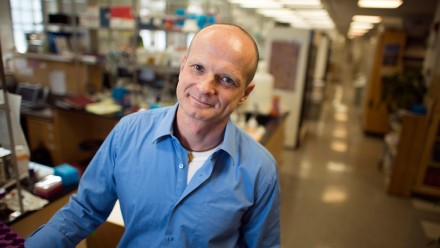Directors Seminar: On the origins of novelty and diversity in development and evolution: case studies on horned beetles
The origin of novel traits is among the most intriguing and enduring problems in evolutionary biology. It is intriguing because it lies at the heart of what motivates much of evolutionary biology: to understand the origins of exquisite adaptations and the transitions and radiations that they enabled. It is enduring because it embodies a fundamental paradox. On the one hand, Darwin's theory of evolution is based on descent with modification wherein everything new, ultimately, must come from something old. On the other hand, biologists are captivated by complex novel traits precisely because they often lack obvious homology to pre-existing traits. How, then, does novelty arise within the confines of ancestral variation?
Combining approaches from evolutionary developmental genetics, ecological genomics, and behavioral ecology my research explores the genetic, developmental, and behavioral mechanisms, and the interactions among them, that promote innovation and diversification in the natural world. Most of the work in my research group focuses on the inordinately diverse and bizarre horns of scarab beetles, while side projects have explored the origins of light-producing organs in fireflies as well as the exuberant helmets of treehoppers. In my talk I will (i) present recent results on the role of developmental cooption and rewiring during horned beetle evolution, (ii) explore the means by which horns have diversified along major axes of diversification, including relative size, position, and sex-specific elaboration, and (iii) discuss the significance of host microbiome interactions and niche construction in the ecological diversification of horned beetles. I will conclude by briefly outlining what has brought me to Canberra and what I hope to accomplish during my sabbatical at ANU.
Professor Moczek received his PhD from Duke University, NC, USA, and is currently a Professor of Biology at Indiana University, Bloomington. He is a fellow of the American Association for the Advancement of Science (AAAS), the Australian-American Fulbright Foundation, and the John Simon Guggenheim Memorial Foundation. His research focuses on the very early stages of innovation in evolution, and the interplay between genetics, development, and ecology in facilitating major innovations and transitions in evolution. He is also a co-leader of an international effort to expand traditional perspectives on what determines speed and direction in evolution to incorporate recent advances in the fields of evolutionary developmental biology, developmental plasticity, non-genetic inheritance, and niche construction. During his time in Australia, Armin will work at the Research School of Biology at the ANU and the Australian National Insect Collection at CSIRO to further advance such a synthesis through both conceptual collaborative efforts as well as empirical work on Australian insects.









